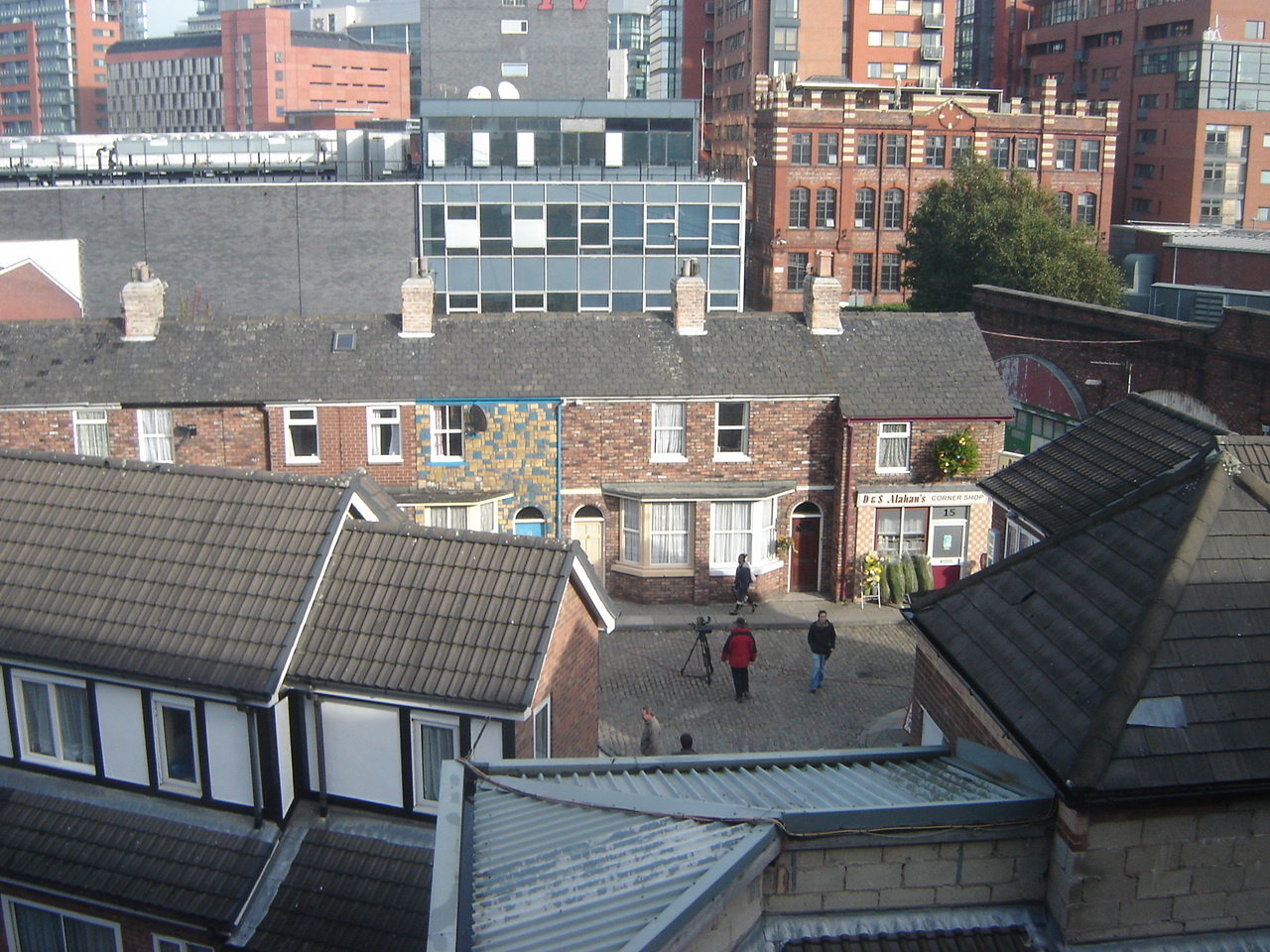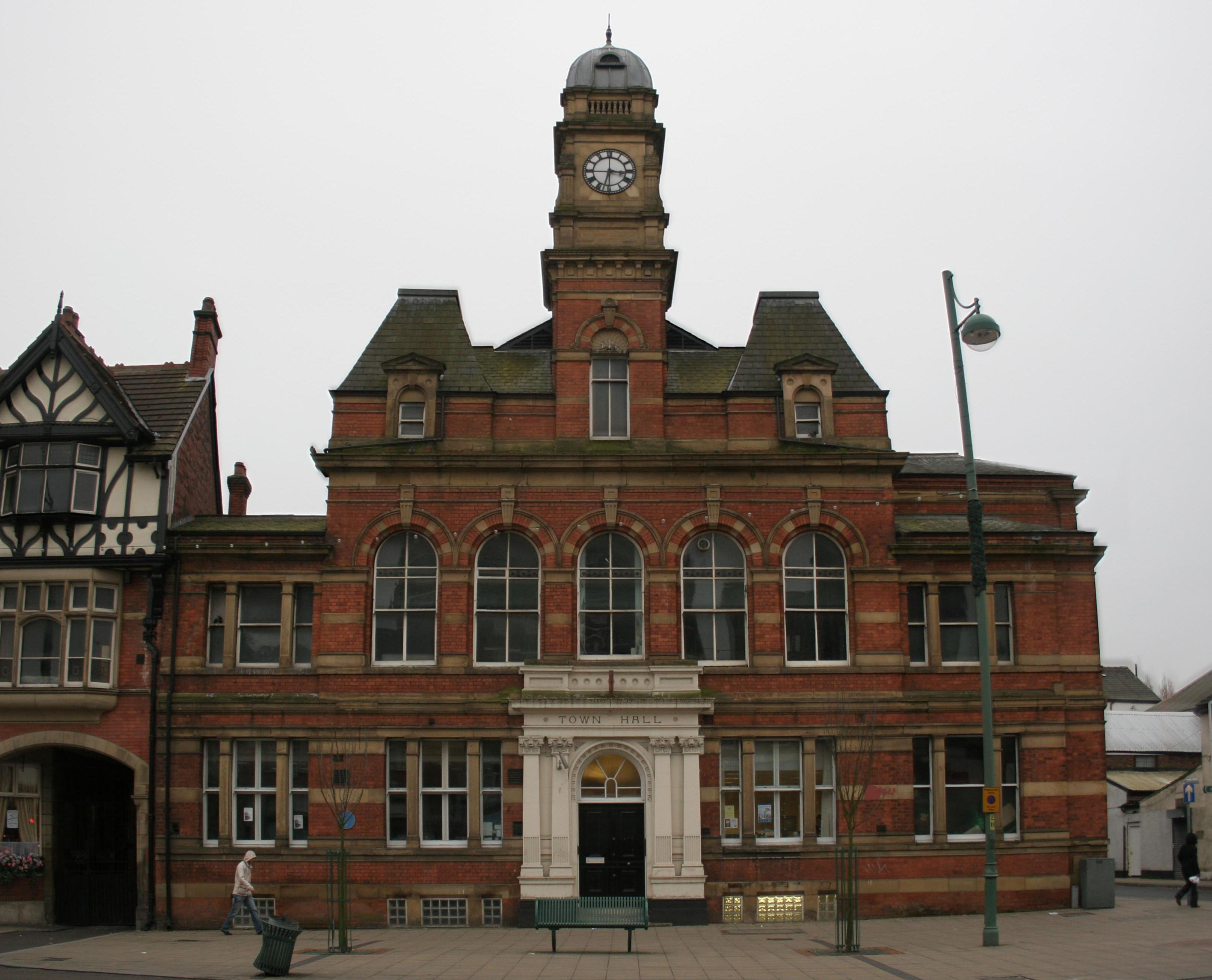|
Having It Off
''Having it Off'' is a one-off TV comedy series for BBC Choice made by Red Production Company in 2002. It was set at a cheap hairdressing salon in Eccles, Greater Manchester. It was shown only once and is not available yet on DVD. Out gay bitchy stereotype Guy La Trousse (played by Antony Cotton, ''Coronation Street'', '' Queer As Folk''), desperately tries to escape the drudge of daily wash and crop and change the fortunes of the salon – and his career. This is all thwarted by April, nymphomaniac loud-mouthed wife of the hairdressers owner. The BBC website describes it as "rude, crude, strongly working-class sitcom on the lesser-seen BBC Choice, ''Having It Off'' promised much yet fell curiously short of the mark, lacking the key that would have propelled it to a higher level". References External links BBC Comedy Guide- Archived @ Wayback Machine The Wayback Machine is a digital archive of the World Wide Web founded by Internet Archive, an American nonprofit ... [...More Info...] [...Related Items...] OR: [Wikipedia] [Google] [Baidu] |
Situation Comedy
A sitcom (short for situation comedy or situational comedy) is a genre of comedy produced for radio and television, that centers on a recurring cast of character (arts), characters as they navigate humorous situations within a consistent setting, such as a home, workplace, or community. Unlike sketch comedy, which features different characters and settings in each Sketch comedy, skit, sitcoms typically maintain plot continuity across episodes. This continuity allows for the development of storylines and characters over time, fostering audience engagement and investment in the characters' lives and relationships. History The structure and concept of a sitcom have roots in earlier forms of comedic theater, such as farces and comedy of manners. These forms relied on running gags to generate humor, but the term ''sitcom'' emerged as radio and TV adapted these principles into a new medium. The word was not commonly used until the 1950s. Early television sitcoms were often filme ... [...More Info...] [...Related Items...] OR: [Wikipedia] [Google] [Baidu] |
Queer As Folk (British TV Series)
''Queer as Folk'' is a 1999 British television series that chronicles the lives of three gay men living in Manchester's gay village around Canal Street. Initially running for eight episodes, a two-part follow up was shown in 2000. It was written by Russell T Davies and produced by Red Production Company for Channel 4. Background The title of the programme comes from a traditional Northern English saying, "there's nowt so queer as folk", meaning "there's nothing as strange as people", and is a word play on the modern-day English definition of "queer" as homosexual. The script had originally started life with the title ''Queer as Fuck'' but ''Queer as Folk'' was considered more suitable. Characters and plot The main characters are Stuart Allen Jones (Aidan Gillen), who is highly sexually active, and successfully so. His long-time friend Vince Tyler (Craig Kelly), who has a crush on Stuart, has less luck with men. 15-year-old Nathan Maloney (Charlie Hunnam) is new to the gay ... [...More Info...] [...Related Items...] OR: [Wikipedia] [Google] [Baidu] |
2000s British Sitcoms
S, or s, is the nineteenth Letter (alphabet), letter of the Latin alphabet, used in the English alphabet, the alphabets of other western Languages of Europe, European languages and other latin alphabets worldwide. Its name in English is English alphabet#Letter names, ''ess'' (pronounced ), plural ''esses''. History Northwest Semitic abjad, Northwest Semitic Shin (letter), šîn represented a voiceless postalveolar fricative (as in 'ip'). It originated most likely as a pictogram of a tooth () and represented the phoneme via the acrophonic principle. Ancient Greek did not have a "sh" phoneme, so the derived Greek letter Sigma (letter), Sigma () came to represent the voiceless alveolar sibilant . While the letter shape Σ continues Phoenician ''šîn'', its name ''sigma'' is taken from the letter ''Samekh'', while the shape and position of ''samekh'' but name of ''šîn'' is continued in the ''Ξ, xi''. Within Greek, the name of ''sigma'' was influenced by its associatio ... [...More Info...] [...Related Items...] OR: [Wikipedia] [Google] [Baidu] |
Television Shows Set In Manchester
Television (TV) is a telecommunication medium for transmitting moving images and sound. Additionally, the term can refer to a physical television set rather than the medium of transmission. Television is a mass medium for advertising, entertainment, news, and sports. The medium is capable of more than "radio broadcasting", which refers to an audio signal sent to radio receivers. Television became available in crude experimental forms in the 1920s, but only after several years of further development was the new technology marketed to consumers. After World War II, an improved form of black-and-white television broadcasting became popular in the United Kingdom and the United States, and television sets became commonplace in homes, businesses, and institutions. During the 1950s, television was the primary medium for influencing public opinion.Diggs-Brown, Barbara (2011''Strategic Public Relations: Audience Focused Practice''p. 48 In the mid-1960s, color broadcasting was in ... [...More Info...] [...Related Items...] OR: [Wikipedia] [Google] [Baidu] |
BBC Television Comedy
The British Broadcasting Corporation (BBC) is a British public broadcasting, public service broadcaster headquartered at Broadcasting House in London, England. Originally established in 1922 as the British Broadcasting Company, it evolved into its current state with its current name on New Year's Day 1927. The oldest and largest local and global broadcaster by stature and by number of employees, the BBC employs over 21,000 staff in total, of whom approximately 17,200 are in public-sector broadcasting. The BBC was established under a Royal charter#United Kingdom, royal charter, and operates under an agreement with the Secretary of State for Culture, Media and Sport. Its work is funded principally by an annual Television licensing in the United Kingdom, television licence fee which is charged to all British households, companies, and organisations using any type of equipment to receive or record live television broadcasts or to use the BBC's streaming service, BBC iPlayer, iPla ... [...More Info...] [...Related Items...] OR: [Wikipedia] [Google] [Baidu] |
Wayback Machine
The Wayback Machine is a digital archive of the World Wide Web founded by Internet Archive, an American nonprofit organization based in San Francisco, California. Launched for public access in 2001, the service allows users to go "back in time" to see how websites looked in the past. Founders Brewster Kahle and Bruce Gilliat developed the Wayback Machine to provide "universal access to all knowledge" by preserving archived copies of defunct web pages. The Wayback Machine's earliest archives go back at least to 1995, and by the end of 2009, more than 38.2 billion webpages had been saved. As of November 2024, the Wayback Machine has archived more than 916 billion web pages and well over 100 petabytes of data. History The Internet Archive has been archiving cached web pages since at least 1995. One of the earliest known pages was archived on May 8, 1995. Internet Archive founders Brewster Kahle and Bruce Gilliat launched the Wayback Machine in San Francisco, California ... [...More Info...] [...Related Items...] OR: [Wikipedia] [Google] [Baidu] |
Coronation Street
''Coronation Street'' (colloquially referred to as ''Corrie'') is a British television soap opera created by ITV Granada, Granada Television and shown on ITV (TV network), ITV since 9 December 1960. The programme centres on a cobbled, terraced street in the fictional town of Weatherfield in Greater Manchester. The location was itself based on Salford, the hometown of the show's first screenwriter and creator, Tony Warren. Originally broadcast twice weekly, ''Coronation Street'' increased its runtime in later years, currently airing three 60-minute episodes per week. Warren developed the concept for the series, which was initially rejected by Granada's founder Sidney Bernstein, Baron Bernstein, Sidney Bernstein. Producer Harry Elton convinced Bernstein to commission 13 pilot episodes. The show has since become a significant part of British culture and underpinned the success of its producing Granada franchise. Currently produced by ITV Studios, the successor to Granada, the seri ... [...More Info...] [...Related Items...] OR: [Wikipedia] [Google] [Baidu] |
Antony Cotton
Antony Cotton (born Antony Dunn; 5 August 1975) is an English actor and comedian, known for portraying the role of Sean Tully in ''Coronation Street'', as well as portraying Alexander Perry in the original '' Queer as Folk'' series. In 2007, Cotton hosted his own talk show titled '' That Antony Cotton Show'', which was cancelled after one series. In March 2013, he won ''Let's Dance for Comic Relief''. Early life Cotton was born Antony Dunn in Bury, Greater Manchester, the son of actress Enid Dunn. He attended Woodhey High School at Holcombe Brook, Ramsbottom, and the Oldham Theatre Workshop. He has an elder brother, Andrew. Career Cotton portrays barman and factory worker Sean Tully on ''Coronation Street'', a role which he has played since 2003. His mother, Enid Dunn, also played several parts in ''Coronation Street'' between 2002 and 2014. Cotton played "Alexander" in the original UK version of '' Queer as Folk''. He has also appeared in episodes of '' Absolutely Fabulou ... [...More Info...] [...Related Items...] OR: [Wikipedia] [Google] [Baidu] |
Greater Manchester
Greater Manchester is a ceremonial county in North West England. It borders Lancashire to the north, Derbyshire and West Yorkshire to the east, Cheshire to the south, and Merseyside to the west. Its largest settlement is the city of Manchester. The county has an area of and is highly urbanised, with a population of 2.9 million. The majority of the county's settlements are part of the Greater Manchester Built-up Area, which extends into Cheshire and Merseyside and is the List of urban areas in the United Kingdom, second most populous urban area in the UK. The city of Manchester is the largest settlement. Other large settlements are Altrincham, Bolton, Rochdale, Sale, Greater Manchester, Sale, Salford, Stockport and Wigan. Greater Manchester contains ten metropolitan boroughs: Manchester, City of Salford, Salford, Metropolitan Borough of Bolton, Bolton, Metropolitan Borough of Bury, Bury, Metropolitan Borough of Oldham, Oldham, Metropolitan Borough of Rochdale, Rochdale, Metropol ... [...More Info...] [...Related Items...] OR: [Wikipedia] [Google] [Baidu] |
Eccles, Greater Manchester
Eccles () is a market town in the City of Salford in Greater Manchester, England, west of Salford, Greater Manchester, Salford and west of Manchester, split by the M602 motorway and bordered by the Manchester Ship Canal to the south. The town is famous for the Eccles cake. Eccles grew around the 13th-century Church of St Mary the Virgin, Eccles, Parish Church of St Mary. Evidence of pre-historic human settlement has been discovered locally, but the area was predominantly agricultural until the Industrial Revolution, when a textile industry was established in the town. The arrival of the Liverpool and Manchester Railway led to the town's expansion along the route of the track linking those two cities. History Toponymy The derivation of the name is uncertain, but two suggestions have been proposed. The received one is that the ''Eccles'' place-name is derived from the Romano-British ''Ecles'' or ''Eglys'' ( in Welsh language, Welsh means 'church'), which in turn is deriv ... [...More Info...] [...Related Items...] OR: [Wikipedia] [Google] [Baidu] |



